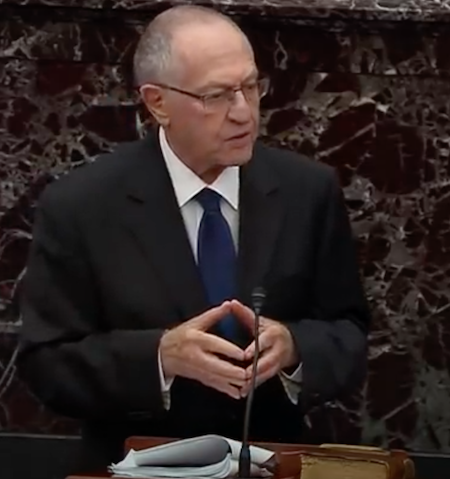Dershowitz: Texas abortion bounty approach could be adopted in states that want to ban handgun ownership

Alan Dershowitz in January 2020. Photo from Wikimedia Commons.
Alan Dershowitz, a professor emeritus at Harvard Law School, is suggesting a political response to the Texas abortion law that offers $10,000 to private citizens who sue those who help secure abortions after about six weeks of pregnancy.
In an op-ed for the Hill, Dershowitz suggested that liberal states could enact laws offering similar bounties for citizen lawsuits against anyone who facilitates the sale or ownership of handguns.
Dershowitz pointed out that the right to abortion and gun ownership are both protected by the U.S. Supreme Court decisions Roe v. Wade and Heller v. District of Columbia. “Two constitutional wrongs do not a constitutional right make,” he wrote, but a handgun bounty could send a message and give pause to conservatives on the Supreme Court considering the Texas law in new challenges.
“It would be hard for the courts to uphold the civil mechanism of the anti-abortion law without also upholding the identical mechanism in the anti-gun law,” Dershowitz wrote.
Citing procedural issues, the Supreme Court refused an emergency request by abortion providers to block the Texas law Sept. 1 by a 5-4 vote. The Department of Justice has now filed a lawsuit in an effort to block the law.
The “shoe on the other foot” approach would emphasize the dangerous implications of the bounty approach, which “if not stopped, could undercut the authority of the Supreme Court to enforce other constitutional rights,” Dershowitz wrote.
“Texas could, for example, next apply it to gay marriage—any private citizen could sue anyone who performed or facilitated same-sex marriages—thus circumventing Obergefell v. Hodges. New York could then apply it to Citizens United v. [FEC] and offer a civil bounty to sue any media outlet that ran corporate political ads. Any state could simply target any Supreme Court precedent it doesn’t like and deter its enforcement by authorizing citizens who oppose it to sue. This would empower every state to effectively overrule Supreme Court decisions.”



